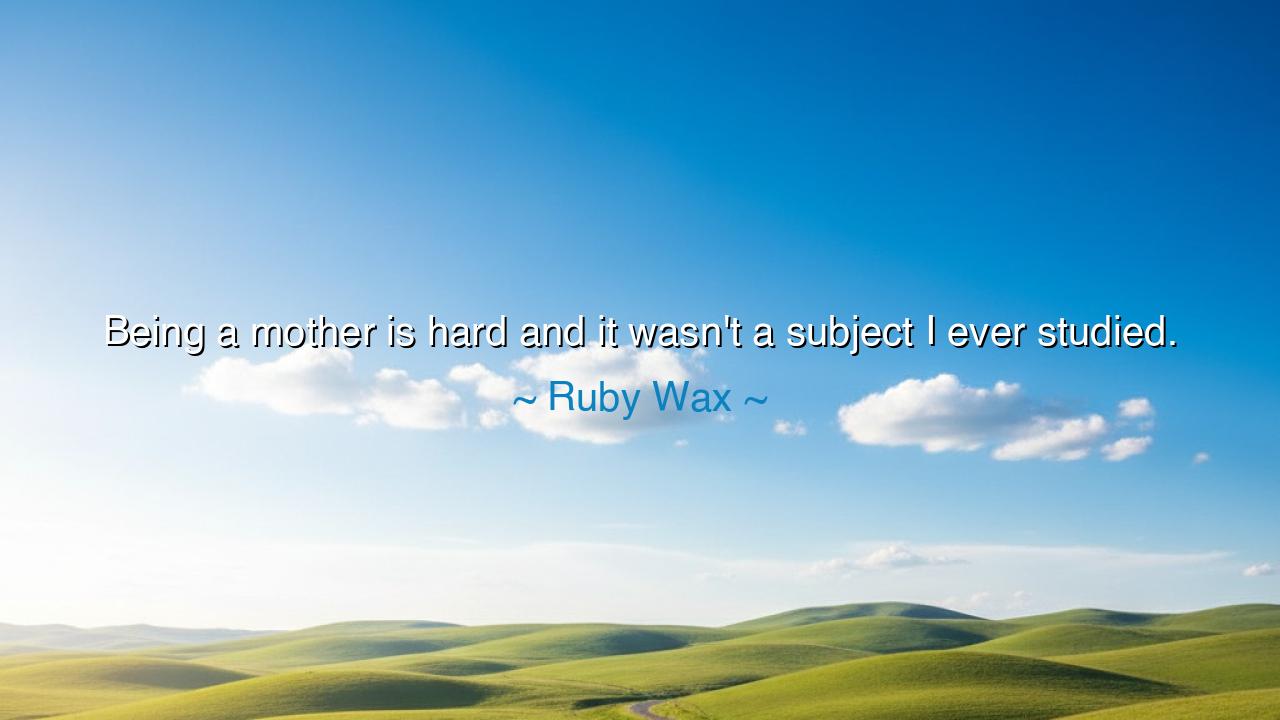
Being a mother is hard and it wasn't a subject I ever studied.






When Ruby Wax said, “Being a mother is hard and it wasn’t a subject I ever studied,” she spoke with the raw candor of experience — the kind that strips away the myth of perfection and replaces it with truth. Her words carry both humility and revelation, for in them lies the admission that motherhood, one of life’s most sacred and demanding callings, comes without preparation, without syllabus, without certainty. It is the ultimate paradox: the world’s most important role, entrusted to those who must learn it as they live it.
In the ancient world, the philosophers would have recognized this truth as the beginning of wisdom — that to acknowledge ignorance is the first step toward understanding. Wax, known for her wit and insight into the human mind, speaks not as one defeated, but as one awakening. Her statement reminds us that parenthood is not knowledge — it is transformation. It is not learned from books, but from nights without sleep, from tears shed in silence, from the constant struggle between love and limitation. Her words echo the humility of those who dare to nurture life despite never feeling ready, those who face chaos armed only with affection and endurance.
The origin of this quote lies in Wax’s own reflections on motherhood, mental health, and the struggle to balance both. A comedian and writer known for her sharp intelligence, Wax often draws upon her own life’s imperfections to expose universal truths. When she says that she never “studied” motherhood, she is rejecting the illusion of mastery — the belief that we can prepare for life’s deepest callings as we do for examinations or careers. Instead, she admits that the role of a mother is a continual apprenticeship in patience, vulnerability, and grace.
Throughout history, even the most revered mothers have learned through pain and uncertainty. Consider Mary, the mother of Christ, who bore the greatest of destinies with the least of understanding. She did not study the task of raising a savior; she simply loved, feared, and trusted. Or Cornelia, mother of the Gracchi brothers in ancient Rome, who raised reformers destined for tragedy, saying only, “These are my jewels.” Like Wax, these women reveal that motherhood is not a science but a sacred mystery — one navigated not through mastery, but through devotion.
There is also a deeper spiritual truth within Wax’s confession. To say “I never studied it” is to acknowledge that love cannot be learned — it must be lived. No instruction can teach the patience required to calm a crying child after exhaustion has set in, nor the wisdom to balance discipline with mercy. The mother becomes a philosopher in her own right, learning through trial what no temple or teacher could ever teach her. And in this unstudied journey, she discovers her own strength — a strength born not from certainty, but from persistence.
Wax’s words also serve as a quiet act of rebellion against the expectations placed upon mothers. In a world that demands perfection — that measures success in comparison, judgment, and sacrifice — she reminds us that motherhood is not about flawlessness, but about resilience. The ancients knew that no hero rises without struggle; so too, no mother thrives without doubt. The courage lies not in knowing, but in showing up — again and again, even when one feels unprepared, even when one feels undone.
So, my listener, take this teaching to heart: do not seek to master love; seek to practice it. Whether you are a mother, a father, a caretaker, or a soul entrusted with another’s well-being, know that imperfection does not disqualify you from greatness — it defines it. Approach each day not as an expert, but as a student of compassion. Let mistakes refine you, not shame you. And when you falter, remember Ruby Wax’s wisdom: that even those who feel unprepared may still be extraordinary, for the truest learning comes not from study, but from love in motion.
Thus, the lesson stands as it has since the dawn of humankind: to nurture life is to walk the hardest road and the holiest one. And though it comes with no manual, it teaches the deepest truths — that love, once given, educates the soul more profoundly than any study ever could.






AAdministratorAdministrator
Welcome, honored guests. Please leave a comment, we will respond soon